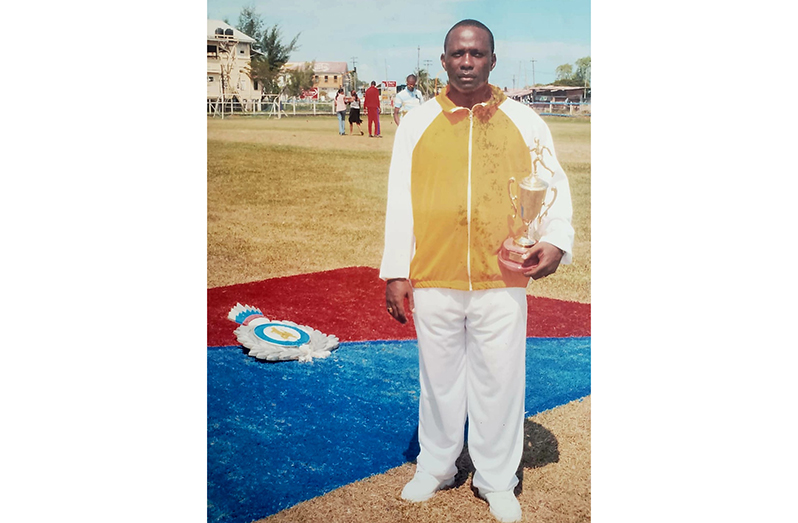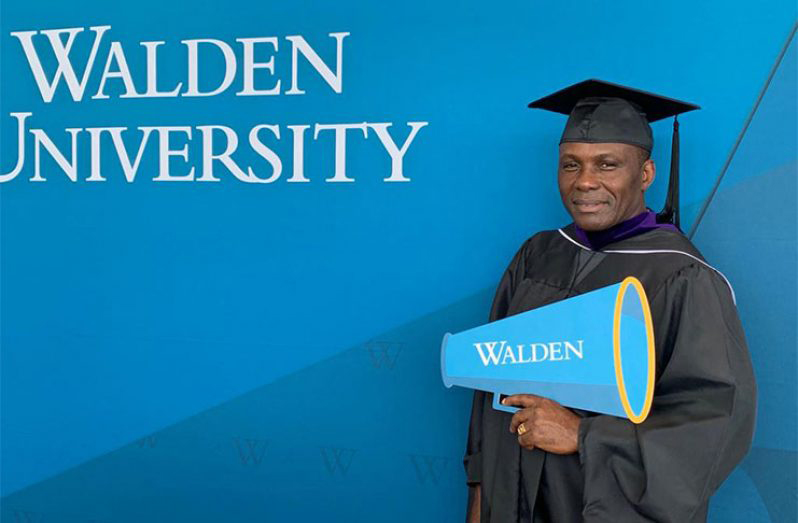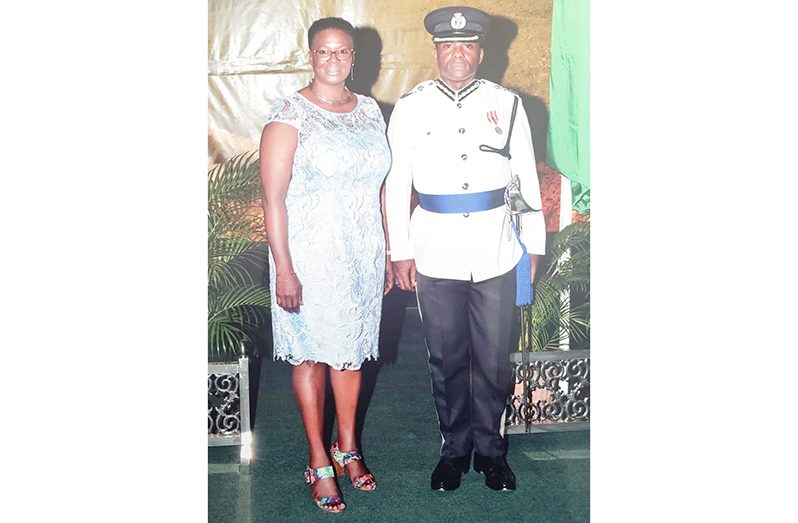ONE of the most prominent individuals that the village of Beterverwagting on the East Coast of Demerara has produced is the Deputy Commissioner of Police, Mr. Paul Williams.
Gracefully sitting under a shaded tree on the lawns of the University of Guyana (UG) campus compound, the Deputy Commissioner of Police, Paul Williams, reflected and related to the Pepperpot Magazine on his journey from his boyhood days to where he is at this moment in his life.
His mother, a seamstress named Enid and a native of the village, got married to Ovid Williams, a former employee of the transport and harbour department and a native of the village of Nabaclis, on the East Coast of Demerara. They had eight children from that marriage.
Boyhood days
Paul Williams was born in what he described as one of the most challenging areas of the village, which was known as the “gulf”. According to him, the gulf was a “backdam side” area that got its name from the “war-like activities” that went on there with the people who truly represented themselves. Every day there was a “fight” or a “curse out” among the people that were living there, but even though it was a tough zone to be in, the Deputy Commissioner was determined, from an early age, to make it out of the toxic environment.
As a child, Williams attended St. Peter’s Roman Catholic Primary School, where he was exposed to the principles of Christianity. He credited the school for nurturing him with understanding, love, respect, values, morals and ethics. Williams also noted that within his family circle and within his neighbourhood, he would have experienced a lot of love, which he appreciates and carries with him to this day.
After finishing primary school, the Deputy Commissioner took his CXC and was accepted into Alleyne’s High School in Georgetown, where he attended up to the third-form level. He was transferred to Annandale Secondary to complete his final two years due to the financial difficulties that his parents were facing.
Knowing of his parents’ financial challenges, Williams decided to go with his sister-in-law to sell black pudding throughout the village and neighbouring communities so that he could pay the bus fares to go to school. Later, he got a stand of his own where he sold icicles and pastries to contribute to his home and his studies. While selling on the street corner, Williams ensured that it didn’t take away from his studies, so he read his books using “jug lamps” to get the work done.
He also ensured that his, his twin sister’s and his younger sister’s clothing were pressed and ready for school. Independence was something that Williams learned, valued and respected from an early age.
Apart from his academics, Williams played a very integral role in athletics during his school life. He performed outstandingly on several occasions and attended the National Championships as well. Over the years, however, Williams noted that he was committed to being good and outstanding in society. Still, it was never with the aim of being “boastful” or “bragging,” but for the simple reason of wanting to contribute meaningfully to the others in his family and his society while continuing to be a simple and humble person.

Career aspirations
The Deputy Commissioner always knew that he wanted to become a police officer, but at the completion of secondary school at the age of 16 years old, he was too young to apply and join the force, so he went on to work at the Guyana Post Office Corporation until he reached the age of 17 years and six months, which was the age that was required of him to apply to the police force as an apprentice. On December 28, 1986, Williams said he went to the Police Training School and wrote the examination.
He recalled that he was the only person there that day to write the examination, which was very surprising to the staff that was there at the time. “Being the only person there that day, after I wrote the exams, they went through it right there and I did well,” he said. “They immediately gave me the necessities that I needed. I returned home and told my mom that I got through, but she wasn’t in favour of it. She was scared of the types of challenges that I would be faced with and the dangers of the job.
She told me that I may die very early because I may have to face criminals and so on, but I told her that it was what I wanted to do and I’m going to do it. I insisted and she, along with my grandmother, the entire community and the church prayed with me.”
Williams explained that he went into the force in February of 1987 and he was sent to the Guyana National Service, where he spent 7 months doing the Joint Services Recruit Orientation Course. That training, according to Williams, was responsible for him getting to know his country, learning a variety of survival techniques and military strategies, and, most importantly, teaching him to be a patriot.
Deputy Commissioner Professional Accomplishments
At the completion of the training, Williams was awarded the second-best student position, and he was also elected as the chairman of his course (8701). He noted that that gave him the understanding of becoming a leader with given responsibilities and learning to be brave and face his superiors with a certain “finesse” and ease in delivering what he had to. He also worked in the traffic department for two years and was promoted to Corporal of Police; eleven years later, he was promoted to Sergeant.
Williams never allowed anything or anyone to deter him from elevating his studies and going after what he was passionate about. According to him, he stayed the course and continues to be a serving member of the Guyana Police Force and he takes pride in knowing where he came from and where he is now despite life’s challenges.
After his career in traffic, the Deputy Commissioner went over to the Criminal Investigation Department (CID) for three years as a driver, but Sergeant R. Angel, who was in charge of him at the time, recognised that he had the potential to be more than just a driver based on a statement that Williams took. The sergeant considered him an asset to the CID and he guided him through his work and he became an investigator.

After being a detective, Williams became a police prosecutor after being sent on a one-year prosecutor course that was sponsored by the United Nations and the University of Guyana (UG) in the Caribbean. Williams decided to pursue law after finishing that course at the University of Georgia, where he took a pre-law course and graduated with a diploma in public management. He also completed his law degree and was sent thereafter to do a course in legislation drafting (drafting laws), for which he received a certificate.
Even though Williams had accomplished so much, he felt in his heart that he still had an appetite for more knowledge. Again he decided to pursue his Master’s in criminal justice and executive management at Walden University in the United States of America (USA) and just when you thought that Williams was done, last year, he completed his PhD in international relations.
Advice to the younger generation
Finally, the Deputy Commissioner of Police would like to let his fellow Baronians, especially the youngsters, understand that “you need to understand the value of Beterverwagting so that you can understand the history. I am appealing to the senior folks that are around to make the history available and let us post it; if there is any way that I can help in getting that done, I would like to,” the Deputy Commissioner explained. “I know what it is to really come up in life with very little. I tried as much as possible to instill this in our youth and get them to understand that they needed to be focused and keep their eyes on the prize. I can give that advice because I have done it. I lived it and it wasn’t easy, but you have to want to have a better life.”
He continued, “ I faced a number of challenges as a child, but I found it rewarding to be born on April 19, 1969, just three years after Guyana gained independence. Even though those were challenging times, BV had a combination of different ethnicities and the people had a close-knit relationship with each other without any racial divide or barriers. In the absence of my parents, whoever was around in the village took responsibility, pitched in and ensured that me and my siblings were taken care of. That was done without anyone thinking about one’s race or colour.”
Paul Williams noted that life has its fair share of challenges and he extended his heartfelt thanks and appreciation to his wife Mrs. Nicola Williams, for her 30 years of support and sacrifices that she has made to ensure that the home and their four kids were okay while he pursued his studies and his career.


.jpg)











